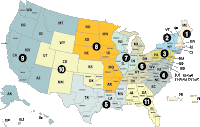In a 4-3 decision released today in Attorney’s Title Insurance Fund, Inc., v. Joseph W. Gorka, Et Al. (SC09-1899), the Florida Supreme Court held a proposal for settlement is invalid if it is conditioned upon actions out of the control of the offeree. The court stated:
This case is before the Court to review the decision of the Second District Court of Appeal in Attorneys‟ Title Insurance Fund, Inc. v. Gorka, 989 So. 2d 1210 (Fla. 2d DCA 2008). The district court certified its decision to be in conflict with the decision of the First District Court of Appeal in Clements v. Rose, 982 So. 2d 731 (Fla. 1st DCA 2008), with regard to the validity and enforceability of a joint offer or proposal of settlement that is conditioned on the mutual acceptance of all joint offerees. We have jurisdiction. See art. V, § 3(b)(4), Fla. Const. We hold that this type of joint offer is invalid and unenforceable because it is conditioned such that neither offeree can independently evaluate or settle his or her respective claim by accepting the proposal. Accordingly, we approve the well reasoned decision of the Second District and disapprove the decision of the First District to the extent it holds otherwise.
***
The issue presented by the conflicting decisions is whether a joint offer of settlement or judgment that is conditioned on the mutual acceptance of all of the joint offerees is valid and enforceable. We approve the decision of the Second District Court of Appeal and hold that this type of joint offer is invalid and unenforceable because it is conditioned such that neither offeree can independently evaluate or settle his or her respective claim by accepting the proposal. The conditional nature of the offer divests each party of independent control of the decision to settle, thereby rendering the offer of judgment invalid and unenforceable.
The majority included Justice Pariente, Justice Lewis, Justice Labarga, and Justice Perry. Justice Polston wrote a dissent and was joined by Justice Canady and Chief Justice Quince.



0 comments:
Post a Comment